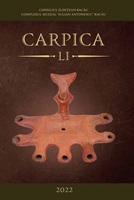Relaţiile bilaterale româno-germane între 1933 şi 1939 reflectate în documente diplomatice
Romanian-German Relations Between 1933-1939 as Reflected in Diplomatic Documents
Author(s): Bianca-Ioana HanganuSubject(s): Diplomatic history, Political history, Social history, International relations/trade, Interwar Period (1920 - 1939), Sociology of Politics
Published by: Complexul Muzeal “Iulian Antonescu” Bacău
Keywords: bilateralism; economic relations; interwar period; diplomacy; revisionism; peace system;
Summary/Abstract: The Romanian-German bilateral relations between 1933-1939 were largely influenced by Romania’s objective of preserving its newly-acquired borders and Germany’s opportunistic revisionism that saw a steady increase in aggressiveness following Adolf Hitler’s accession in January 1933. Both countries were keen on securing their interests and in doing so they found that their economic pursuits were a common ground. Commerce was indeed a constant element on which the relations between the two countries developed. Otherwise, the Romanian-German relations were an accurate representation of the distrust that was specific during that time among the international community. Diplomatic documents highlight, on the one hand, Germany’s volatile policy and, on the other hand, Romania’s wavering attitude towards revisionist countries, including Germany and the Soviet Union, and the growing political and ideological disorder it was facing.
Journal: Carpica
- Issue Year: 2022
- Issue No: LI
- Page Range: 387-400
- Page Count: 14
- Language: Romanian

